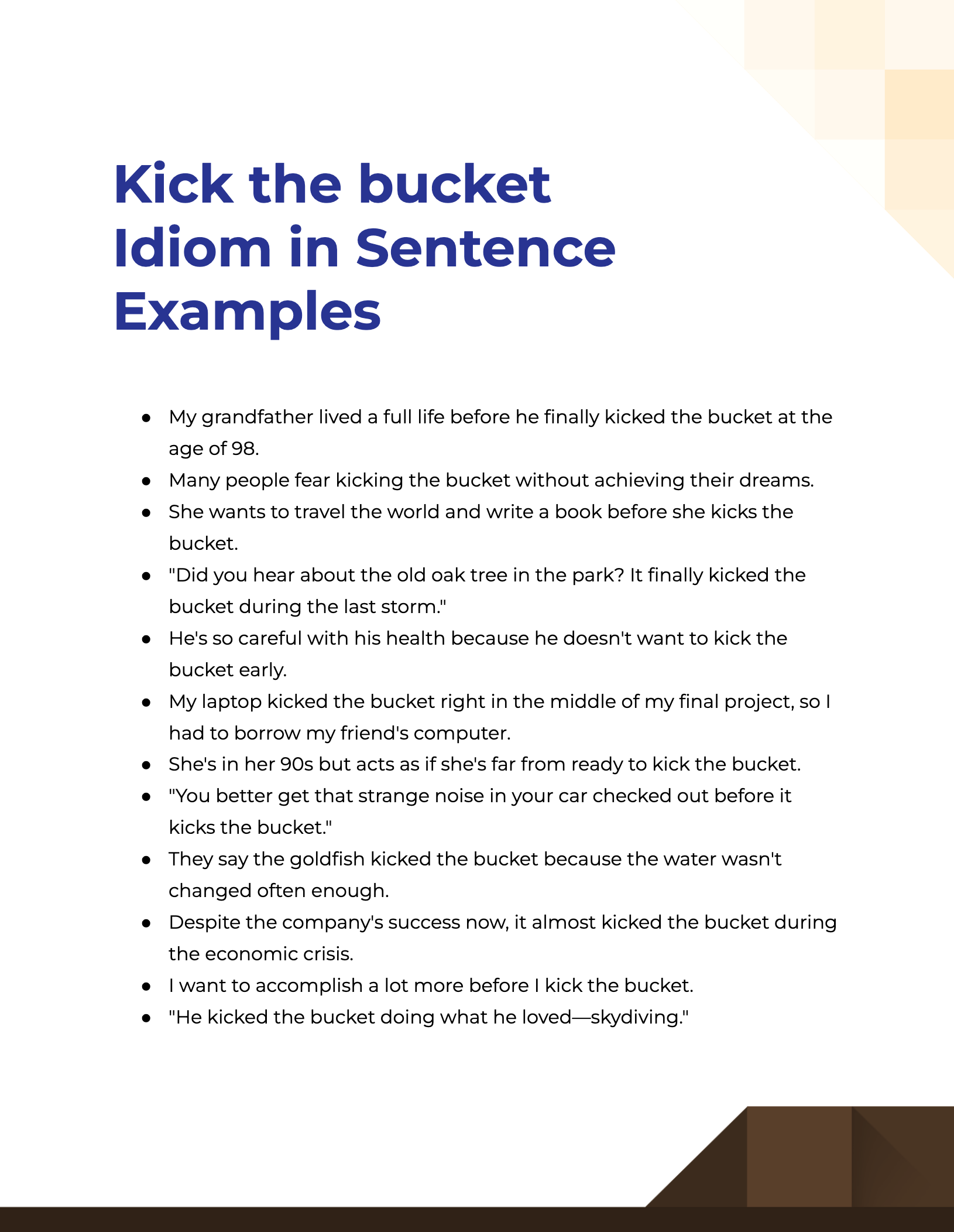19+ Kick the bucket Idiom Examples
Unlock the mystery behind the intriguing idiom “Kick the Bucket.” This expression is more than just a collection of words; it’s a vivid way to discuss a delicate topic. Our comprehensive guide will delve into the origins of this well-known phrase, its meaning, and how you can effectively incorporate it into your vocabulary. With unique sentence examples and handy tips, this guide is your go-to source for mastering “Kick the Bucket.”
What is the Kick the bucket Idiom? – Definition
“Kick the Bucket” is an idiom that means to die or pass away. It is often used in a more casual or euphemistic manner when talking about death.
What is the Meaning of Kick the bucket Idiom?
This phrase is commonly used as a lighter or less direct way of discussing death. Instead of saying someone has died, you might hear that they “kicked the bucket.” It takes a serious topic and gives it a colloquial, if not slightly humorous, treatment.
Origin of Kick the bucket Idiom
The exact origins of “Kick the Bucket” are unclear, but several theories exist. One popular theory suggests it comes from the method of slaughtering pigs; the animal would kick a bucket placed under it as it was being hung. Another theory links it to old English pubs where a bucket was used as a makeshift stand for suicide. Regardless of its origins, the phrase has been deeply embedded into the English language and is widely recognized.
20 Best Sentence Examples with Kick the bucket Idiom

- My grandfather lived a full life before he finally kicked the bucket at the age of 98.
- Many people fear kicking the bucket without achieving their dreams.
- She wants to travel the world and write a book before she kicks the bucket.
- “Did you hear about the old oak tree in the park? It finally kicked the bucket during the last storm.”
- He’s so careful with his health because he doesn’t want to kick the bucket early.
- My laptop kicked the bucket right in the middle of my final project, so I had to borrow my friend’s computer.
- She’s in her 90s but acts as if she’s far from ready to kick the bucket.
- “You better get that strange noise in your car checked out before it kicks the bucket.”
- They say the goldfish kicked the bucket because the water wasn’t changed often enough.
- Despite the company’s success now, it almost kicked the bucket during the economic crisis.
- I want to accomplish a lot more before I kick the bucket.
- “He kicked the bucket doing what he loved—skydiving.”
- When it comes to bucket lists, it’s all about what you want to do before you kick the bucket.
- I heard their old washing machine finally kicked the bucket, so they had to buy a new one.
- His business kicked the bucket due to poor financial management, and he had to start from scratch.
- “After many decades of service, the town’s old bridge has finally kicked the bucket.”
- I hope to learn at least three languages before I kick the bucket.
- “Don’t worry about that old rumor; it kicked the bucket years ago.”
- “If you keep running that old lawnmower without proper maintenance, it’s going to kick the bucket soon.”
- She’s making a documentary about what people want to achieve before they kick the bucket.
How to Use Kick the bucket Idiom in Sentences?
The idiom “kick the bucket” is a colloquial expression that describes the act of dying or the end of something’s useful life. Though the term is often used light-heartedly, it can also be inappropriate or insensitive in certain contexts. Here’s how you can skillfully incorporate this idiom into your sentences:
- Context is Key: Given that the phrase deals with the concept of death or ending, make sure the context is suitable for its use. It’s generally inappropriate for solemn or serious circumstances surrounding death.
- Literal or Figurative: Remember that while the idiom can refer to literal death, it can also describe the end of an object’s useful life. For example, “My phone kicked the bucket, so I need a new one.”
- Subject Placement: The subject who “kicks the bucket” should be clearly stated or implied in the sentence. For example, “My car finally kicked the bucket.”
- Tense Matters: Use the appropriate tense based on what you are trying to convey. For example, “He kicked the bucket last year” (past tense) or “If you don’t water the plant, it will kick the bucket” (future tense).
- Use in Questions and Exclamations: The idiom can also be framed as a question or an exclamation. For instance, “Has your old printer kicked the bucket yet?”
- Avoid Redundancy: Since the idiom itself means dying or the end of something, avoid redundant phrases like “he died when he kicked the bucket.”
Tips for Using Kick the bucket Idiom
- Know Your Audience: Given that the phrase deals with death, it’s crucial to know your audience’s sensitivities. In formal or sensitive settings, a more straightforward term would be more appropriate.
- Vary Usage: While the idiom is popular, try to vary your language so that your speech or writing doesn’t become monotonous. Other idioms like “bite the dust” or “meet one’s maker” can be used for variety.
- In Negative Sentences: You can use the idiom in negative sentences to imply that someone or something is still alive or functional. For instance, “Despite all the challenges, the company didn’t kick the bucket.”
- With Modifiers: Adding adverbs can give more context to the situation. For example, “The old television finally kicked the bucket.”
- Cultural Sensitivity: Be aware that idiomatic expressions might not translate well into other languages or cultures, so use them cautiously in multicultural settings.
By following these guidelines, you can employ the idiom “kick the bucket” effectively in your everyday language while remaining mindful of the context and the sensitivities of your audience.



